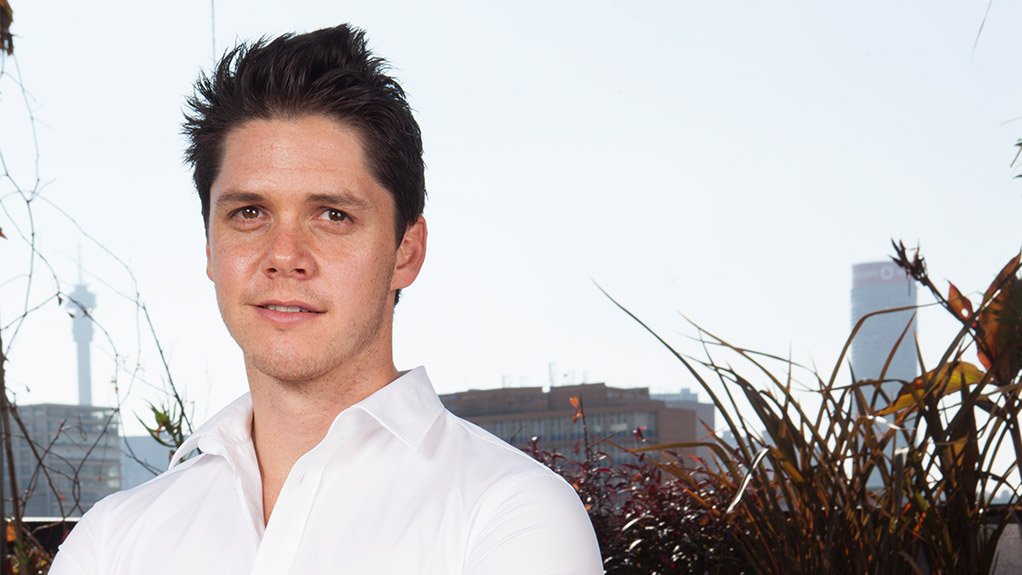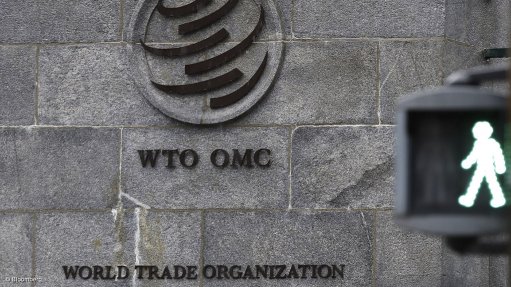Diamond in the Rough


A MAN ON TOP Although 37, The Kit Group CEO Andrew Robinson reasons that he has more work experience than most 50 year olds
There’s massive consolidation taking place in the textiles industry and one of the reasons that I am here is that I believe in the resurgence of the South African industry,” says newly appointed CEO of uniform and personal protective equipment manufacturer and supplier The Kit Group, Andrew Robinson, who quips that he did not know he had a brain until he left school.
The Johannesburg-born 37-year-old sat at the back of the class, where he stared out of the window all day, dreaming up his next entrepreneurial venture. He started his first business at 13, geared towards the needs of his fellow classmates, while attending King David High School, in Linksfield, Johannesburg.
“Although I am only 37, I suppose I have more work experience than most 50-year-olds. I used to work so that I could pay the smartest kids in class to do my homework.”
As such, he has always been securing the services of the most qualified. “I realised very quickly that you don’t have to be the best, but you have to surround yourself with the best. “I’ve made sure that other people’s strengths complement my weaknesses, surrounding myself with grey-haired warriors – people with experience,” says Robinson, who eventually had to drop art as a subject in Grade 11 because in matric he would be required to draw in front of someone. It was only a few years later that he broke the news to his mother that not one of his artworks she had proudly hung on her walls and for which Robinson had received A’s were his.
“I’ve gone from jock to nerd. I used to spend my weekends coaching cricket,” notes Robinson, who, following matric, received a scholarship to play cricket at Rhodes University, in Grahamstown, Eastern Cape, where “I learned I had a brain” and that he had Attention Deficit Disorder.
Rhodes was also where he realised that he didn’t want to be a cricketer. “I wanted to be the owner of the cricket team, so I dropped out of university.” Robinson then enrolled to do a BCom through the University of South Africa and started an information technology company, which gave him enough money to travel.
Subsequently, he travelled around Asia – India, China, Thailand and Malaysia – and lived on $2 a day, travelling back and forth between South Africa and Asia.
“I went to that part of the world because all I had to live on was $2 a day and that was my university in life.”
At 21, he tried to raise R15-million to educate the less fortunate. “I’ve always had a big social conscience, so I tried to raise some capital because I came up with an idea that I believed was going to educate the nation, while making me some money.” However, when Robinson’s efforts failed to pan out, he felt disheartened. “So, I thought, stuff this, I’m out of here.” He left South Africa for the UK on a working holiday visa.
“I arrived in London with no place to stay, very little money and I didn’t have a job.”
He was adamant, however, about entering the investment banking arena and approached recruitment agencies with this in mind. But, with an unrecognised degree, no international experience, no MBA and a working holiday visa, the response was: “Are you mad? Rather become a barman or a waiter.”
This response made him even more determined to pursue this career path. So, Robinson proceeded to contact the CEOs of five of the biggest banks in the UK to meet with him for a cappuccino. “They all agreed to meet with me” he says, adding that he even flew to Switzerland to meet with Ivan Glasenberg, the CEO of one of the world’s largest commodity trading and mining companies, Glencore.
His efforts were fruitful, seeing him employed on the commodities desk at Macquarie Bank as an analyst. “I was part of the living dead and I absolutely hated it. Every morning you wake up at 05:00, put on a suit, get on the tube where no one makes eye contact – noses stuck in the newspapers – repeat, repeat, repeat . . . ”
But it was during this soul-destroying time that he came across the Sipahh, a straw filled with small flavoured beads with filters on either end that, when used to drink milk, created a milkshake.
The Australian inventor had approached the bank for capital and when he “sucked on this thing” Robinson had a lightbulb moment.
After six years, the product was in 150 000 retail stores in 60 countries worldwide, with Robinson the “sales guy” who launched the invention globally.
“It was a very interesting time in my life.” How-ever, at 28, he found himself in court with one of the world’s largest food companies and realised that a patent was as strong as the amount of money you had to defend it.
With legal fees mounting, Robinson was running out of funds and ended up settling out of court. “It was the single worst decision I have made in my life.” He lost everything and returned to South Africa to move in with his mother at the age of 30.
For five years he had averaged three flights a week, three continents a month and had offices in multiple countries around the world. “My home was where I plugged in my mobile phone.”
“So, I came back to South Africa and thought, start-ups are just too difficult”, looking instead for an established business to buy. At this point, he was introduced to corporate clothing company Altitude Clothing, following which he came in as the CEO and turned the company around, later exiting.
“What gets me out of the bed in the morning is building something from the ground up.”
Through Sipahh and Altitude Clothing, Robinson was introduced to the African market and partnered with industrialist
Vivian Imerman, now his mentor, to buy Thirsty Now Beverages, a massive spirits company doing business across Africa.
He is always looking for sectors on the decline. “When people are getting out, I like to get in.”
As such, Robinson was once again drawn to the textiles industry, which has been on a substantial decline.
Robinson was introduced to The Kit Group by Sasfin, a common shareholder. The business started 25 years ago and is described by the entre-preneur as a rough diamond that has the potential to become the largest player in the sector in Africa, where it is already active in Botswana, Namibia, Mozambique and Angola.
Robinson took an equity position nine months ago and came in as CEO, saying: “Things are going incredibly well.”
He says the textiles industry is recession-proof as its clients, such as those operating in the security sector, which “isn’t going anywhere”, will always need to dress their staff. This is one of the reasons he saw an opportunity.
The Kit Group supplies major contracts consisting of between 30 000 and 40 000 people, supplying industrial workwear, the labour brokering sector, the corporate clothing space, healthcare and the banking sector.
The company currently employs just more than 300 people nationally and comprises eight branches and 30 on-site premises at customers’ facilities, a model Robinson is keen to grow. “We are a logistics solutions company, not a clothing company.”
Robinson aims to strengthen the company’s online base, as well as its African footprint, with The Kit Group rolling out in the Democratic Republic of Congo, Zambia and Zimbabwe in the next six months.
“As our South Africa-, US- and European Union-based customers grow into the continent, we grow with them. We will be investing heavily in manufacturing in South Africa and Africa. However, textiles are a very high-duty product and, as such, we need to align with trade agreement to ensure efficiencies,” he highlights.
The company, which Robinson says has an aggressive acquisition path to buy factories, already owns facilities and is a big supporter of developing female-run cut, make and trim factories. He sees The Kit Group investing tens of millions over the next three years, growing over five years to be a giant in Africa.
The industry is in absolute disarray, comprising a number of mom-and-pop shops and unregulated mass retrenchments, but “we are going to consolidate the market”, Robinson enthuses, stressing that a lack of investment is holding back the industry.
“To buy an industrial sewing machine costs R10 000, [as such] you can create a job for R10 000,” he calculates.
“Government should be looking at the textiles industry more seriously. Government should protect against imports and invest in production through grants. “We are on par with quality, but advancements in the textiles space are also not massive and are lacking in South Africa.”
Comments
Announcements
What's On
Subscribe to improve your user experience...
Option 1 (equivalent of R125 a month):
Receive a weekly copy of Creamer Media's Engineering News & Mining Weekly magazine
(print copy for those in South Africa and e-magazine for those outside of South Africa)
Receive daily email newsletters
Access to full search results
Access archive of magazine back copies
Access to Projects in Progress
Access to ONE Research Report of your choice in PDF format
Option 2 (equivalent of R375 a month):
All benefits from Option 1
PLUS
Access to Creamer Media's Research Channel Africa for ALL Research Reports, in PDF format, on various industrial and mining sectors
including Electricity; Water; Energy Transition; Hydrogen; Roads, Rail and Ports; Coal; Gold; Platinum; Battery Metals; etc.
Already a subscriber?
Forgotten your password?
Receive weekly copy of Creamer Media's Engineering News & Mining Weekly magazine (print copy for those in South Africa and e-magazine for those outside of South Africa)
➕
Recieve daily email newsletters
➕
Access to full search results
➕
Access archive of magazine back copies
➕
Access to Projects in Progress
➕
Access to ONE Research Report of your choice in PDF format
RESEARCH CHANNEL AFRICA
R4500 (equivalent of R375 a month)
SUBSCRIBEAll benefits from Option 1
➕
Access to Creamer Media's Research Channel Africa for ALL Research Reports on various industrial and mining sectors, in PDF format, including on:
Electricity
➕
Water
➕
Energy Transition
➕
Hydrogen
➕
Roads, Rail and Ports
➕
Coal
➕
Gold
➕
Platinum
➕
Battery Metals
➕
etc.
Receive all benefits from Option 1 or Option 2 delivered to numerous people at your company
➕
Multiple User names and Passwords for simultaneous log-ins
➕
Intranet integration access to all in your organisation



















